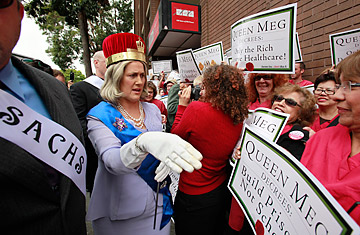
An actress dressed as "Queen Meg" greets members of the California Nurses Association (CNA) during a rally at the CNA offices in Oakland, Calif., on June 25, 2010
In her gubernatorial campaign, California billionaire Meg Whitman fancies herself a turnaround artist, not unlike CEOs who take on failing companies and put them in the black. In her analysis of why the nation's most populous state and the world's 12th largest economy has a chronically dysfunctional government, one villain stands out: public-employee unions.
The former eBay CEO promises she will cut the state-government payroll by 40,000 jobs. She says she can do this because, as a self-funded candidate willing to spend a mind-boggling $150 million of her own money, she will take office owing the unions and other special interests no favors. Whitman has declared, "I am tough enough to stand up to the unions and the politicians they control." Republican consultant Kevin Spillane says it is an open secret in Sacramento that public-employee pensions, benefits and pay are not sustainable at current levels. "Given the severity of the recession," Spillane tells TIME, "it is both politically possible and financially necessary for compensation and pensions to be reformed."
The unions, of course, have taken notice of Whitman's attack and are fighting back. Led by the feisty California Nurses Association (CNA), they are challenging Whitman on the campaign trail and backing the candidacy of Democrat Jerry Brown. And so in one corner, the nurses engage in street theater that entertains and provokes as they take on Whitman. In the other is the candidate who has spent an astonishing $91 million thus far, hiring the best political consultants money can buy. "Californians love nurses, teachers and firefighters, but they hate the unions that these folks belong to," says Jack Pitney, a professor at Claremont McKenna College and a former GOP official. "If it's Meg vs. nurses, teachers and firefighters, she loses. [But] if it's Meg vs. the union bosses, she wins." (For now, the frugal Brown is neck and neck with Whitman in the polls, even though he has spent all of $500,000.)
In satire meant to resonate with people suffering in the worst economic downturn since the Great Depression, the nurses' union has shadowed Whitman at campaign events with an actress dressed as "Queen Meg." Nurses leader Rose Ann DeMoro says the parody campaign, complete with a bus and supporting actors, mocks Whitman's "assumption that her vast personal wealth of $1.3 billion and record spending in the Republican primary entitles her to be anointed governor and carry out her corporate agenda of eroding public and workplace protections, slashing safety-net programs and muffling the voice of working people and their unions."
Last week, as Whitman campaigned in Southern California, more than 1,000 unionized nurses wearing red hospital scrubs held a rally outside her home in Atherton, a leafy enclave of Silicon Valley's rich and powerful. Wearing a blue gown and gold crown, Queen Meg was accompanied by two assistants wearing tuxedos with sashes of "Goldman" and "Sachs," in reference to Whitman's time on the reviled investment bank's board of directors. "We are not going to let Meg Whitman push us around," said Margie Keenan, a nurse from Long Beach, addressing the crowd. "We are here to push back and defend our state." The Whitman campaign shot back with a statement by retired nurse Alice Hansen: "The radical leadership of this union does not represent the vast majority of California nurses."
On the spreadsheet, public-employee unions would seem a ripe target for cost-conscious politicians. Across the nation, many state and local government workers are able to retire earlier than their private-sector counterparts and enjoy generous benefits including pensions. But flesh-and-blood public servants — nurses, schoolteachers, firefighters and highway-patrol officers — perform essential functions. When public coffers run so dry that the police department no longer answers nonemergency calls — as was announced by crime-ridden Oakland recently when it laid off 80 police officers — public-sector pain affects the community at large.
Only a small percentage of CNA's 85,000 nurses work for the state, but budget cuts and furloughs affect the state agencies on which the nurses depend. CNA spokesman Chuck Idelson gives this example: In November, the union filed a detailed complaint about conditions at UC Davis Medical Center with the California Department of Public Health. Idelson says, "As of mid-June, the department had still not assigned an investigator to the case."
Whitman says she wants to "downsize or rightsize" Sacramento and take the state's payroll back to what it was five years ago. At that time, Republican Governor Arnold Schwarzenegger was in his first term. The Terminator came to office promising to curb the power of the unions but met his match when his ballot initiatives, designed to reform California's government in a sharply conservative direction, were decisively defeated at the polls. The countercampaign was smart and irresistible. In the run-up to the vote, Schwarzenegger's nemesis on television was a petite Asian-American schoolteacher castigating the governor for turning against the public schools.
The Whitman team is trying to avoid the Goliath-vs.-David trap Schwarzenegger fell into. "Meg is trying to differentiate between the leaders and the profession," says former Republican consultant Allan Hoffenblum. "She is going after the union leaders while saying, 'I love nurses.' It will be interesting if this works." Gale Kaufman, a Democratic strategist who led the coalition that derailed Schwarzenegger's conservative agenda, is skeptical. "Whitman has shown little understanding of what public employees do except in the broadest strokes."
Last month, Schwarzenegger convinced six of the state's public-employee unions to agree to pension concessions and pay cutbacks. If the state's other public-employee unions made similar deals, it would save the general fund $1.2 billion and help close California's $19.1 billion deficit. Whoever is sworn into office in January — be it Whitman or Brown — will have to take up the laborious task of getting the unions to agree to cutbacks.
